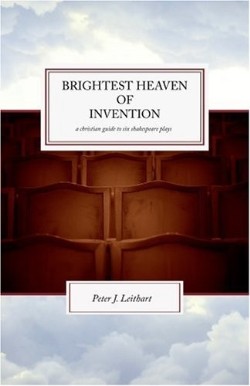Prince Hamlet, distraught by his widowed mother’s rapid remarriage, is approached by his father’s ghost demanding revenge on his murderer. Torn by conflict, Hamlet is maddened by this command, causing all around him to worry for him and setting in motion a plot which ends, as you may know, with almost every survivor dying at a fencing match.
Shakespeare’s Hamlet is a complex study of revenge, internal conflict, evil, madness, and sadness. I have read it before, studied it, memorized portions, and discussed it, but it was not until this year that I really understood it.
Besides reading the play itself and pondering the illuminating chapter on Hamlet in Brightest Heaven of Invention, we watched the Royal Shakespeare Company’s production with David Tennant playing Hamlet.
1. Hamlet by the Royal Shakespeare Company
Rather than stuffy period costumes in an ancient castle, this production involved security cameras, bare feet, toques, an orange t-shirt, and suits. Both Hamlet and Ophelia portrayed their anguish in thoroughly modern ways, and I finally sensed what the play was about, at least on one level.
Tennant’s intense acting made even the soliloquies fascinating. Poor Ophelia almost made me cry, and she melted the hearts of the king and queen, too. Polonius acted as silly as Shakespeare intended him to, and Gertrude, Hamlet’s mother, was loving but clueless…possibly. At one point I could almost sympathize with Claudius the murderous king, and perhaps it was meant to be that way.
Mr. 17, Miss 14, and I watched Hamlet together, and it impacted us deeply. We had planned to view one of the many other Hamlet movies as well, but after this we decided not to. As Mr. 17 said, “This was great. Watching another one would spoil it.” To discover what the Royal Shakespeare Company’s Hamlet is really like, please read Miss 14’s excellent review.
Movie cautions: Hamlet is much too intense for children, obviously. Of course there is violence as well as insanity, but it is fairly controlled despite all the deaths. At one point, Ophelia, in her madness, strips down to her underclothing.
2. Hamlet, the Play
There are many annotated Hamlets. Some explain the text so thoroughly that you can almost skip Shakespeare’s actual words and just read the explanations on the facing page. Many present an interpretation of Hamlet that is invariably less rich, less wise, and less complex than Shakespeare’s own representation of the world.
Rather than picking up one of these popular versions of Hamlet, I urge you and your teens just to try to read the play itself. You can easily find it online for free. Of course you won’t understand all of Hamlet, just as you cannot understand all of life, but you’ll absorb what speaks to you at the time.
3. Brightest Heaven of Invention by Leithart
After all that, if you want to study the play—and remember, actually studying the play is not necessary, especially if you’ve been deeply absorbed in it—you can pick up one of the many available guides.
We used Leithart’s book Brightest Heaven of Invention: A Christian Guide to Six Shakespeare Plays. In four lessons, Leithart first discusses the play as a whole and then works through it in detail. He provides review questions, thought questions, and possible essay topics. He approaches literature from a deeply Christian point of view and has taught me much that earlier secular teachers had not. I am very thankful that my children can explore Shakespeare with his guidance. (Note that this book has no answer key; you’ll have to study alongside your children.)
Leithart also discusses three movie versions of Hamlet, but the Royal Shakespeare Company version with David Tennant appeared years after the book did. I would have loved to see his opinion on it.
If you and your teens are going to study Hamlet, I highly recommend the Royal Shakespeare Company’s movie as well as Leithart’s book Brightest Heaven of Invention: A Christian Guide to Six Shakespeare Plays. And, of course, the play itself. (Note that Leithart and the Royal Shakespeare Company differ in their interpretations; we learned from both as well as from their differences.)
As discussed in the comments on my blog earlier, we recommend reading a short plot outline before watching the play, but we do not insist on reading the actual play before watching the movie…because plays are meant to be watched, not read.
For a mini-review of two other Hamlet movies, see Linda Fay’s excellent post, Shakespeare Movies for the Family.
—
If you enjoyed this review, you might want to connect with me on GoodReads where I eventually share what I read or friend me on Facebook where I occasionally show up.
Disclosure: As usual, I present my own honest opinions and am not compensated in any way for this post.



This is useful as I’m working through the logistics of studying some Shakespeare next year. I see from your previous post about Henry V that you usually start with a comedy. Which would be your first choice? I must admit that I’m not a great Shakespeare fan but the time has come!
Thank you for the question about starting Shakespeare. That seems to be an excellent topic for a blog post sometime in the next few weeks. Thanks!
For starters, I suggest you see if any Shakespeare plays are being put on in parks in your area; they are often accessible and family-friendly and are one of the highlights of our summers. Of course, you could also begin to enjoy the summaries for children by Lamb or Nesbitt.
I’m getting into the Dialectic stage with my oldest, and Shakespeare is one of those things I love and I want to teach, but scared me to death. I’m loving these posts. They’re really taking the fear out of it. We won’t get too into Shakespeare this cycle, but when we come back around in Rhetoric, I am going to have a much firmer grasp. Thank you!
Thanks so much for sharing this with us at Trivium Tuesdays! You’re making me wish my kids were older so we could start this stuff, but I won’t wish away their little years =)
I just came across this post (quite a while after it was written) and greatly appreciate it. My son (16) is doing a study of Shakespeare this year; we just finished Julius Caesar and are about to start Hamlet. Leithart’s book is absolutely wonderful — I highly recommend it. I also plan to use the Lambs’ Tales From Shakespeare when I can (it has narratives of many, but not all, of Shakespeare’s plays). Thank you for your encouragement about just getting right in there and immersing yourself in a Shakespearean play, whether you think you “get” it or not, and for reminding us that “the PLAY’S the thing” (as opposed to just the reading).
You’re welcome, Lucy. It seems we enjoy the same resources! I hope you are having a good time studying Hamlet!
[…] ‘Shakespeare’ has always been one of my perceived weaknesses. My own past experience has left me feeling quite inadequate to introduce my own children to his works. However the Lord is gracious and sent along a wonderful godly woman who has had loads of experience in introducing her own children and many besides, to Shakespeare’s works. By attending these workshops together, we have discovered that Shakespeare is actually quite enjoyable. It is a delight to hear my children giggling at the humour and sharing with their father the story of our chosen play as it unfolds. With all that buzzing about my head, it was a delight to read Annie Kate’s post ‘Resources for Shakespeare’s Hamlet‘. […]